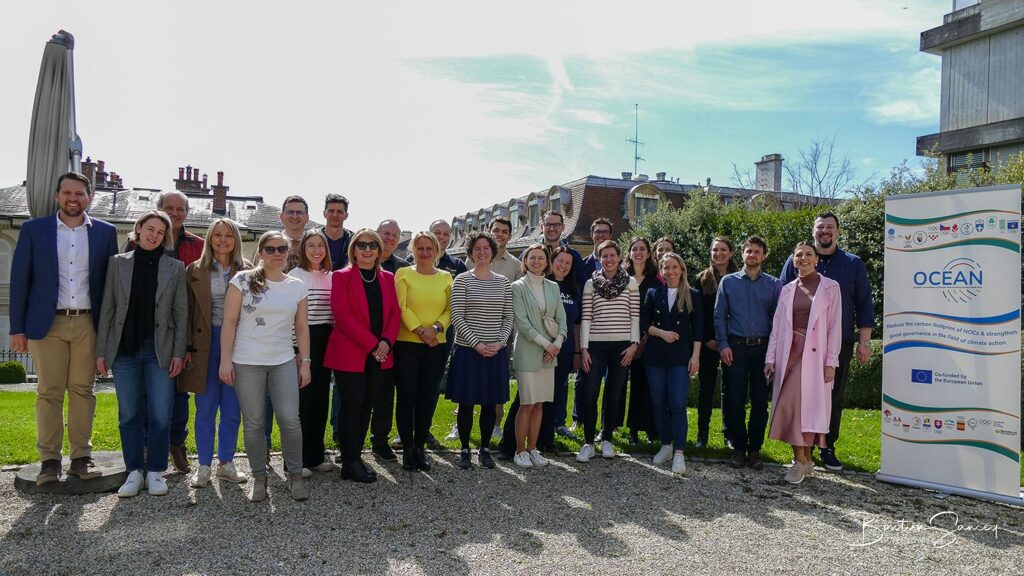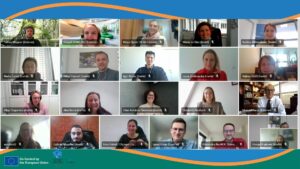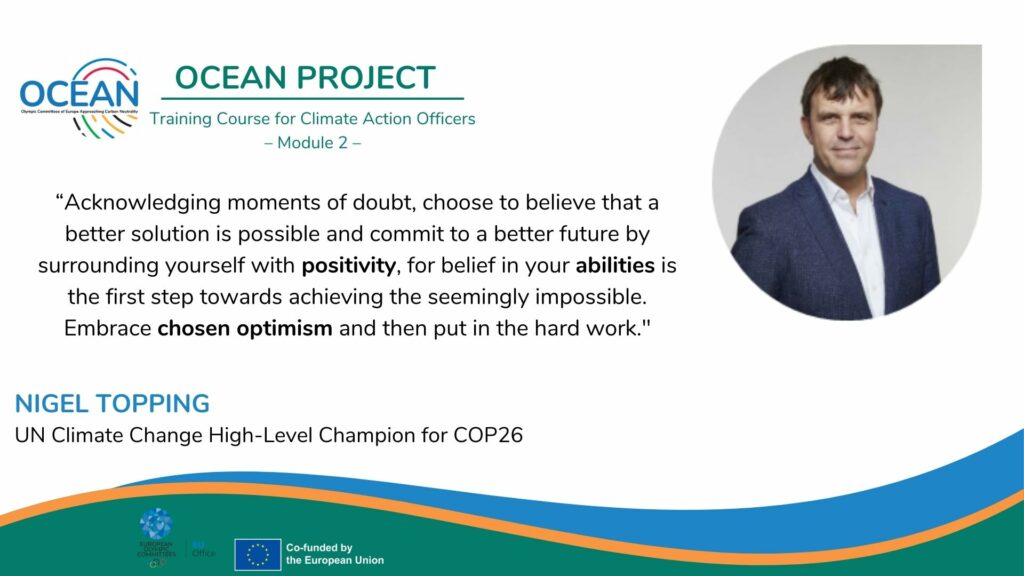The 18 Climate Action Officers engaged in the OCEAN Project started to develop their NOC’s carbon footprint reduction strategy, during a 3-day meeting in Lausanne.
From 18 to 21 March, the Climate Action Officers from the 18 partner National Olympic Committees (NOC) met in Lausanne to assess the progress made and acknowledge the first successes, one year after the launch of the OCEAN project (Olympic Committees of Europe Approaching Carbon Neutrality).
The 18 Climate Action Officers discovered their organisation's carbon footprint after working together with the Öko-Institut on the measurement over the last twelve months. It allowed them to understand their main sources of emissions and to engage in several discussion rounds with the Öko-Institut and Julie Duffus, from the IOC, on how NOCs can move forward in their transition and join the UN Sports for Climate Action Framework. After learning about the main steps of the carbon reduction process, the NOCs’ Climate Action Officers reflected on potential objectives to set and measures to take.
Jon Wyatt’s shared experience as Sports Director at the International Hockey Federation (FIH), managing his organisation's sustainability department gave the OCEAN Consortium valuable information to consider on how to manage the process of implementing a carbon reduction strategy. On this basis, Climate Action Officers were fully equipped to start drafting their carbon footprint reduction strategy.
The results of the NOCs’ carbon footprint measurement will be shared publicly in the course of this Spring, following which the Online Tool for carbon footprint measurement will be revealed to the public at the end of the year. In the meantime, Climate Action Officers are to finalise their NOC’s carbon footprint reduction strategy. The OCEAN Project will conclude in April 2025.

The third Consortium Call took place on January 23. The EOC EU Office organised this online conference to set up a feedback session on the various actions that have been implemented since the second Consortium Call in November and to give a summary of the tasks that would be coming up.
The Öko-Institut has presented the progress made in collecting data from each NOC. It should be submitted, reviewed and finalised before the next step of the OCEAN project, scheduled in Lausanne at the ANOC and IOC Headquarters from 18 to 21 March. Module 3 of the Training Course aims to enable NOCs to understand their carbon footprint, using the data analysis provided by the Öko-Institut and thereby start to elaborate a carbon reduction strategy.
In the meantime, Climate Action Officers will be asked to share some examples of good practices that they may have already implemented within their organisation.

The OCEAN project is moving forward after completing the second module of the Training Course for Climate Action Officers, organised by Lina Taylor, Olympian and Founder of Climate Executive Coaching. Climate Action Officers from each partner NOC had the opportunity to receive advice on leadership in sustainability from Climate Executive Coaching professionals as well as distinguished visitors over four weeks. OCEAN was honoured to have Nigel Topping, UN Climate Change High-Level Champion, Julie Duffus, IOC Sustainability Senior Manager, and Jon Wyatt, Sport and Sustainability Director of the International Hockey Federation (FIH).

Week 1 – Leading for Sustainability in Sport
Climate Action Officers shared their wishes regarding their NOC's environmental future as well as the difficulties they are facing when working on their NOC’s footprint. Coaches presented the "leadership value chain" to discover viable choices for a more sustainable sports governance. Climate Action Officers were given coaching tips that included key leadership qualities on how to get everyone on board.
Week 2 – Change Management Skills – Building Opportunities
OCEAN welcomed Jon Wyatt, Sport and Sustainability Director of the International Hockey Federation (FIH), who shared its management expertise and emphasised on the importance of effective communication across different levels of sports organisations, particularly between athletes and leadership boards. Furthermore, Climate Action Officers were presented with various personality types and how to use different communication techniques according to the interlocutor through practical exercises.
Week 3 – Culture Change Skills – Transformation Through Storytelling
The third session of the Training Course aimed to provide Climate Action Officers with information on how to implement a cultural shift towards greener sports. OCEAN had the privilege of hosting Nigel Topping, UN Climate Change High-Level Champion, whose role is to strengthen collaboration and drive action from businesses, investors, organisations, cities and regions on climate change, and coordinate this work with governments and parties to the United Nations Framework Convention on Climate Change (UNFCCC). Nigel Topping stressed the significance of good narrative and alignment of interests among many stakeholders when tackling sustainability strategy in sports.

Week 4 – Business Case for Sustainability in the Olympic Movement
Climate Action Officers had the opportunity to interact with Julie Duffus, IOC Sustainability Senior Manager, who discussed the business aspects of sustainability in sports with Manuel Parga, NOC of Spain, and Climate Executive Coaching experts. Climate Action Officers identified the beneficial impact that investing in sustainability can have on sports organisations.
The OCEAN project is thankful for the involvement of Climate Executive Coaching in this Module 2, whose specialists will continue coaching Climate Action Officers in the following weeks, this time in the format of individual meetings. The journey of OCEAN Climate Action Officers throughout the OCEAN project will continue with Module 3 in March 2023, when the consortium will assemble in Lausanne at the IOC and ANOC headquarters. Meanwhile, the Öko Institute will host Seminar 2 on carbon footprint measuring in December.

